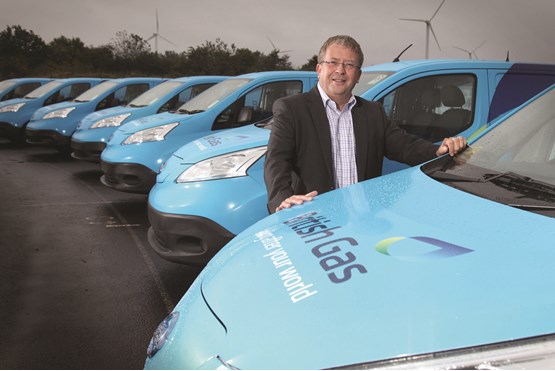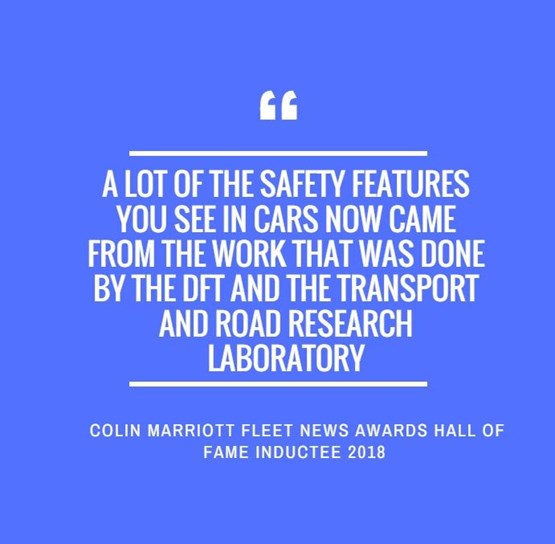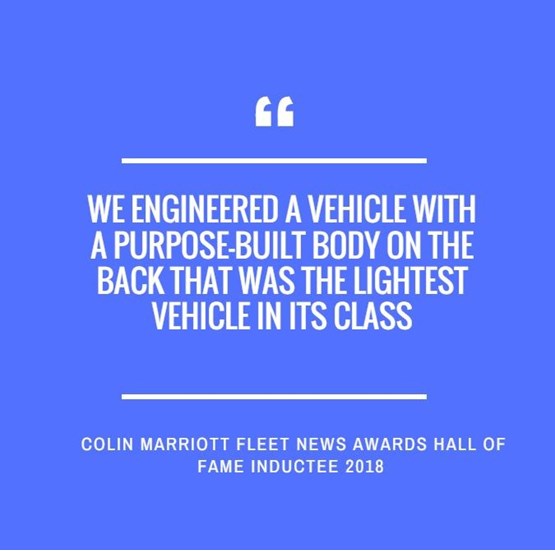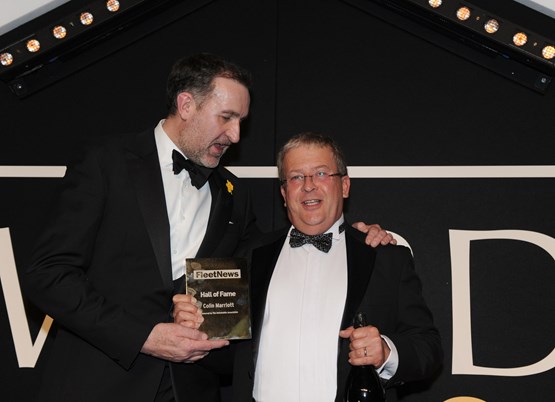Head of the British Gas fleet for 26 years and Fleet News Hall of Fame inductee Colin Marriott has many reasons to look back on his career with pride. Andrew Ryan reports
Colin Marriott’s career was one full of big numbers: 26 years heading the fleet of Centrica subsidiary, British Gas, a final fleet size of 12,500 vans and 2,200 cars, and business mile-age during that time of up to 1.8 billion.
However, it is the smallest figure of all which is one of his proudest career achievements: zero fatal injuries to an at-work driver.
This is a fitting reflection of his commitment to improving safety, a passion instilled in him through early personal experiences.

“Well before I took charge of the fleet we had a much-loved driver who used to drive one of the big British Gas trucks delivering white goods,” says Marriott, who opted for early retirement last year at the age of 56.
“He was stood on the back of a flatbed in our yard in Southampton in really heavy rain when he tripped, fell off the trailer, hit his head on the ground and was fatally injured.
“I was one of the first on the scene. It was a guy I had a lot of respect for and what really left a lasting effect on me was that just falling three feet was enough to kill him.
“I’ll never forget it.”

This was not his first experience of seeing the risks associated with operating vehicles.
After beginning his career as an engineer at the naval dockyards in Portsmouth, where he was apprentice of the year for consecutive years, Marriott worked at the then Vehicle and Operator Services Agency (VOSA) and vehicle inspectorate.
As part of a specialist team which inspected cars involved in serious or fatal accidents, he did not investigate what caused an incident, more what caused the injury.
For example, how deeply was the steering wheel nut buried within the wheel? Was it positioned somewhere where it would cause an injury?
“Through working with the Department for Transport (DfT), the inspectorate was able to start changing legislation and encourage motor manufacturers to pay more attention to the design of cars,” says Marriott.
“A lot of the safety features you see in cars now came from the work that was done by the DfT and the Transport and Road Research Laboratory.
"The occupant crash safety cell came out of it, front and rear seatbelt usage came out of it, as did airbag technologies.
READ MORE: ‘Ensuring the safety of British Gas drivers is the key priority’
“It was really interesting stuff and it meant an everyday part of my life was looking at what could happen if things go wrong in a motor vehicle.
“That, coupled with when we lost that driver at British Gas, meant safety became an underlying passion of mine.”
His commitment to safety was adhered to by both his employers and his team, and he says he was very fortunate to work for an organisation that “put safety at the heart of everything it did” because it helped win backing for a wide range of initiatives.
In 2006, British Gas became one of the first organisations to roll-out speed limiters across its van fleet, it took the decision to fit winter tyres all year round for safety and operational reasons and it also created a Young Driver Academy to successfully improve driver behaviour in the company’s highest risk drivers. All of these contributed to an excellent safety record.
“One of the things I’m most proud of in my time as fleet manager for British Gas is that the fleet probably travelled 1.6bn-1.8bn miles and we never had a single operational driver in a van fatally injured,” says Marriott.

“I’m convinced that if we hadn’t speed limited our fleet, with the sheer number of miles the fleet was driving, some of our drivers would have been involved in high speed incidents and we might have seen some loss of life.”
Marriott also pays tribute to the organisation’s willingness to invest in quality vehicles, equipment, racking and safety gear.
“We would physically go to look at every vehicle that had been involved in a serious incident to see if we were adopting the right strategies and, without doubt, some of that kit saved engineers’ lives,” he adds.
While improving safety was a core focus for Marriott, this had to dovetail with the main aim for any fleet: to ensure that its vehicles were operationally fit for purpose.
“Giving the operation the right tools to do the job has to be the number one priority of any fleet manager, but engineering the safety and other aspects required of a vehicle around that operational performance is critical and that appealed to me,” he says.
READ MORE: Kwik Fit to supply British Gas with tyre services following exclusive contract
“I really used to enjoy that side of the job. Often in British Gas there wasn’t something you could plug into that someone else had already done. You were often inventing.
“For example, British Gas decided it would have its own people doing loft insulation, cavity wall insulation and things like that.
“The challenge was sent straight into our office to say ‘right, we need a vehicle that is going to be able to do this’, and that was really good fun.
“It becomes an even greater challenge when you’ve got a severe payload restriction and, therefore, anything you add to the vehicle impacts on its operational performance.
“Our loft insulation vans were operating right on the maximum gross vehicle mass, so we engineered a vehicle with a purpose-built body on the back that was the lightest vehicle in its class.
“We had meetings with suppliers and motor manufacturers, the racking companies and the leasing or fleet management company if we were funding the vehicle through them, and then we had to get the network to maintain them.
“Whatever the requirement it was always really exciting.
“Another fresh challenge came when Centrica bought The AA and we were involved in running that fleet of recovery vehicles for some time. That was exciting as well.”
The appetite to innovate was present throughout Marriott’s career. As an engineer, this clearly manifested itself in vehicles and technology – for example, British Gas introduced the UK’s largest electric van fleet in 2013 – but he was also key to developing British Gas’s total cost of ownership model.
Creating this ‘zero based budget’ – as it was called then – was one of his first challenges when he joined the company in 1986.
He had to take the most popular models on the fleet, look at potential repair, service costs etc., to give British Gas insight into vehicle operation and selection.
“That was the birth of total cost of ownership in British Gas, and, 26 years on, all the experience of me, my team in particular, and the fleet management company, have all gone into this TCO model which is the bible now,” he says.

“Any new product or any alternative fuel vehicle you want to put on to the road, you bolt it into that model and what pops out at the end of it is the most cost-effective vehicle in that type of application.”
British Gas also became one of the first large fleets to go to a fully outsourced service provision in 1995. Before that, the company’s regions had their own workshops and made the bulk of their own procurement decisions.
“We closed all the workshops, outsourced all the maintenance, and engineers became home-based with depots closing, so, over that time, we gained a lot of experience with outsourcing,” says Marriott.
“I had the privilege of meeting and working with some great people in the industry and that stems right from motor manufacturers, to commissioning companies, to fit-out companies and racking makers, fleet management and leasing companies – there are some brilliant people in the UK.
“It had been a priority of mine to have relationships with those people where it is not just a customer-supplier relationship.
"It is worth the effort to deepen the relationship with any of your suppliers, share with them your strategy, what your business is trying to achieve and get them on board with that.
“The response to working with suppliers in that manner was phenomenal. They innovated, they did things to help British Gas all the time and it was a privilege to work with people like that.
“Without those relationships I had in the industry, the team of people I had around me at British Gas and the extended teams in some of our suppliers, we would not have been able to achieve what we did.”
Marriott lists his relationship with suppliers as another of his proudest achievements, and the respect was mutual as a surprise at his British Gas leaving ‘do’ demonstrated.
“I was in a little room with just my team and, all of a sudden, in poured people I worked with from the supply chain,” he says.
“There must have been 30 or 40 people representing the companies I had worked with, from motor manufacturers, livery, racking and fleet management companies, to share a sandwich and a cup of tea.
“That was a very proud moment that these people would take time out from their busy lives to come and wish me a warm farewell.”
His other, more public, send-off was also a particularly proud moment: his induction into the Fleet News Hall of Fame at the Fleet News Awards ceremony last year.
The honour was well deserved, but it came as a complete surprise to Marriott. “I was there without any knowledge that I was going into the hall of fame,” he says.

“Some must think I was a bit of a mug not realising or not being aware that something was going to happen, but I was invited along under the pretence that I was retiring and wouldn’t it be nice to come to such a big, prestigious event and meet everyone.
“When Huw Edwards started reading out the hall of fame nomination he said ‘this guy started his career in Portsmouth dockyard’ and I turned to the young lady sitting next to me and said ‘oh, I might know him’, so it was a real surprise.
“I do get embarrassed about these sorts of things, but that was a really nice piece of recognition in front of a lot of people I’ve worked with, so that was a nice send-off.”
Marriott has now been retired for around a year and is enjoying life away from the stresses of managing one of the country’s biggest fleets.
“For some time, I’d decided that as much as I loved my job and the industry, I would retire early,” he says.
READ MORE: Fleet News Awards 2018: the results
“There were some personal reasons that encouraged my thinking along the way such as losing family far too young, but we’ve all got to retire some time and you only get one chance to retire early.
“I think I’ve been a very motivated fleet manager at work and I’m motivated out of work as well, so to the surprise of one or two who have often rung me up and made the joke, I don’t sit in bed waiting for the Jeremy Kyle Show to start.
“I’m an absolute petrolhead, so I’ve started going to auctions, I’ve got a classic motorcycle that I play with, and a few other things.
“I love the outdoor living, so my wife and I have some electrically-assisted mountain bikes which we take on holiday with us. When she retires, we will be doing more and more of that.
“I seem to have adapted to retirement quite well!”



















Login to comment
Comments
No comments have been made yet.